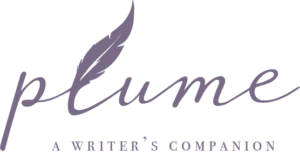Our mission is to build a supportive writing community for women and non-binary writers. We write. We share inspiration. We encourage. Together, we create an energizing community space for writers:
- Plume: A Writer’s Podcast: Our podcast features successful women and non-binary writers, from emerging writers to bestselling novelists and award-winning poets. Our conversations and literary roundtables showcase hard-working talented writers, as we seek advice, insight, and inspiration to bring us back to our collective community. Along the way, our goal is to help writers believe in their voices and projects.
- Our Weekly Drop-in Zoom Group: Now in its third year, this is a virtual drop-in support group, where writers check in about current projects and share writing challenges and triumphs. We also write together in response to a new writing prompt each week.
- Our Plume Slack Channel: This is an online virtual space where women and non-binary writers can share resources, ask questions, connect with other writers, share writing prompts and projects, and offer and receive support in a safe, private space.
- Plume’s Monthly Accountability Group: Plume’s newest community-building addition, the Accountability Group, is designed for writers tackling large-scale writing projects. We meet to set goals, discuss strategies, offer encouragement, and help hold ourselves and each other accountable.
Through Plume’s literary community, we seek to uplift, showcase, and encourage women and non-binary writers wherever they are on their creative writing journey. We’re here to fan each other’s flames.
Visit our Patreon page to learn more about Plume’s affordable membership. Our podcast is available for free on all major podcast platforms.
Become a Plume Patron. Get access to our exclusive online writing community on Slack, bonus podcast content, and more.
Crystal K. Odelle
I met Suzanne in graduate school–she was a year (and a generation) behind me and started out with an emphasis in fiction but soon expanded her studies. I remember one conversation we had. She was complaining about the “old dudes” in her fiction workshop. How they were dismissive of her (and the younger writers). And I said, “Suzanne, those old dudes are the same age as me!” and she said, “But you’re not like them at all!” I think I fell a little bit in love with her in that moment. She’s one of the most well-read people I know and has incredible insight and talent. She’s published in all three genres: fiction, poetry, and creative nonfiction. Those old dudes could have learned something… I know I’ve learned from her and appreciated her critique on much of my work. I had the pleasure of doing my dissertation hours with her. PLUME: When did you know you were a writer?SR: I think I knew when I started writing stories for school and other kids liked hearing them. I used to bring stories I’d written for show and tell instead of objects. To me, even as a child, writing was something to be shared. My favorite part of every school day was when teachers would read aloud to us from a novel. I remember rushing in from lunch, sitting on the carpet, feeling excitement just to hear a little more of whatever book we were reading together. l I was lucky enough to attend a school that really encouraged self-expression at an early age. I took journal writing classes all through middle school and learned about consistency–how writing every day could become not only emotionally satisfying but that you filled pages of a book and that book became the book of your life–days weren’t just passing, you were filling up pages, and that seemed purposeful. As a teenager I became more interested in poetry. I read as much as I could get my hands on. I would go to the used bookstore near my house and sit in the poetry section reading. I found writers that way: Erica Jong, Adrienne Rich, Anne Sexton, Sapphire, Sylvia Plath. I also was reading classics in school; Shakespeare, the short stories of John Cheever; Baudelaire; Rimbaud. It all became an inspirational soup. I consumed texts at school and texts at home. It was all encouraged. My parents never … Read more


























